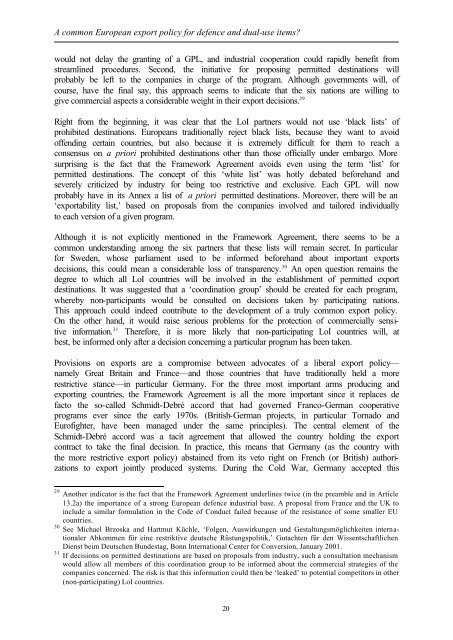A common European export policy for defence and dual-use items?
A common European export policy for defence and dual-use items?
A common European export policy for defence and dual-use items?
You also want an ePaper? Increase the reach of your titles
YUMPU automatically turns print PDFs into web optimized ePapers that Google loves.
A <strong>common</strong> <strong>European</strong> <strong>export</strong> <strong>policy</strong> <strong>for</strong> <strong>defence</strong> <strong>and</strong> <strong>dual</strong>-<strong>use</strong> <strong>items</strong>?<br />
would not delay the granting of a GPL, <strong>and</strong> industrial cooperation could rapidly benefit from<br />
streamlined procedures. Second, the initiative <strong>for</strong> proposing permitted destinations will<br />
probably be left to the companies in charge of the program. Although governments will, of<br />
course, have the final say, this approach seems to indicate that the six nations are willing to<br />
give commercial aspects a considerable weight in their <strong>export</strong> decisions. 29<br />
Right from the beginning, it was clear that the LoI partners would not <strong>use</strong> ‘black lists’ of<br />
prohibited destinations. <strong>European</strong>s traditionally reject black lists, beca<strong>use</strong> they want to avoid<br />
offending certain countries, but also beca<strong>use</strong> it is extremely difficult <strong>for</strong> them to reach a<br />
consensus on a priori prohibited destinations other than those officially under embargo. More<br />
surprising is the fact that the Framework Agreement avoids even using the term ‘list’ <strong>for</strong><br />
permitted destinations. The concept of this ‘white list’ was hotly debated be<strong>for</strong>eh<strong>and</strong> <strong>and</strong><br />
severely criticized by industry <strong>for</strong> being too restrictive <strong>and</strong> exclusive. Each GPL will now<br />
probably have in its Annex a list of a priori permitted destinations. Moreover, there will be an<br />
‘<strong>export</strong>ability list,’ based on proposals from the companies involved <strong>and</strong> tailored indivi<strong>dual</strong>ly<br />
to each version of a given program.<br />
Although it is not explicitly mentioned in the Framework Agreement, there seems to be a<br />
<strong>common</strong> underst<strong>and</strong>ing among the six partners that these lists will remain secret. In particular<br />
<strong>for</strong> Sweden, whose parliament <strong>use</strong>d to be in<strong>for</strong>med be<strong>for</strong>eh<strong>and</strong> about important <strong>export</strong>s<br />
decisions, this could mean a considerable loss of transparency. 30 An open question remains the<br />
degree to which all LoI countries will be involved in the establishment of permitted <strong>export</strong><br />
destinations. It was suggested that a ‘coordination group’ should be created <strong>for</strong> each program,<br />
whereby non-participants would be consulted on decisions taken by participating nations.<br />
This approach could indeed contribute to the development of a truly <strong>common</strong> <strong>export</strong> <strong>policy</strong>.<br />
On the other h<strong>and</strong>, it would raise serious problems <strong>for</strong> the protection of commercially sensitive<br />
in<strong>for</strong>mation. 31 There<strong>for</strong>e, it is more likely that non-participating LoI countries will, at<br />
best, be in<strong>for</strong>med only after a decision concerning a particular program has been taken.<br />
Provisions on <strong>export</strong>s are a compromise between advocates of a liberal <strong>export</strong> <strong>policy</strong>—<br />
namely Great Britain <strong>and</strong> France—<strong>and</strong> those countries that have traditionally held a more<br />
restrictive stance—in particular Germany. For the three most important arms producing <strong>and</strong><br />
<strong>export</strong>ing countries, the Framework Agreement is all the more important since it replaces de<br />
facto the so-called Schmidt-Debré accord that had governed Franco-German cooperative<br />
programs ever since the early 1970s. (British-German projects, in particular Tornado <strong>and</strong><br />
Eurofighter, have been managed under the same principles). The central element of the<br />
Schmidt-Debré accord was a tacit agreement that allowed the country holding the <strong>export</strong><br />
contract to take the final decision. In practice, this means that Germany (as the country with<br />
the more restrictive <strong>export</strong> <strong>policy</strong>) abstained from its veto right on French (or British) authorizations<br />
to <strong>export</strong> jointly produced systems. During the Cold War, Germany accepted this<br />
29 Another indicator is the fact that the Framework Agreement underlines twice (in the preamble <strong>and</strong> in Article<br />
13.2a) the importance of a strong <strong>European</strong> <strong>defence</strong> industrial base. A proposal from France <strong>and</strong> the UK to<br />
include a similar <strong>for</strong>mulation in the Code of Conduct failed beca<strong>use</strong> of the resistance of some smaller EU<br />
countries.<br />
30 See Michael Brzoska <strong>and</strong> Hartmut Küchle, ‘Folgen, Auswirkungen und Gestaltungsmöglichkeiten internationaler<br />
Abkommen für eine restriktive deutsche Rüstungspolitik,’ Gutachten für den Wissentschaftlichen<br />
Dienst beim Deutschen Bundestag, Bonn International Center <strong>for</strong> Conversion, January 2001.<br />
31 If decisions on permitted destinations are based on proposals from industry, such a consultation mechanism<br />
would allow all members of this coordination group to be in<strong>for</strong>med about the commercial strategies of the<br />
companies concerned. The risk is that this in<strong>for</strong>mation could then be ‘leaked’ to potential competitors in other<br />
(non-participating) LoI countries.<br />
20
















